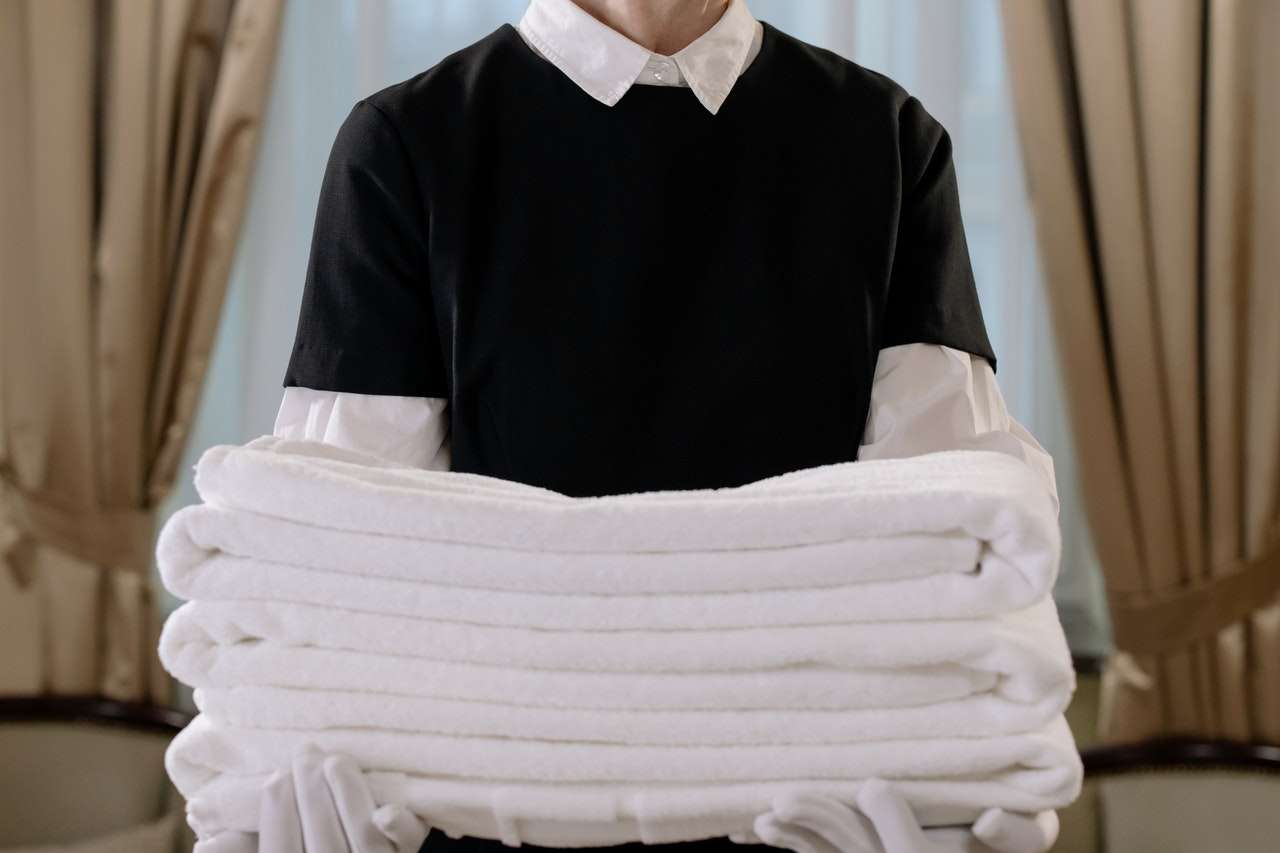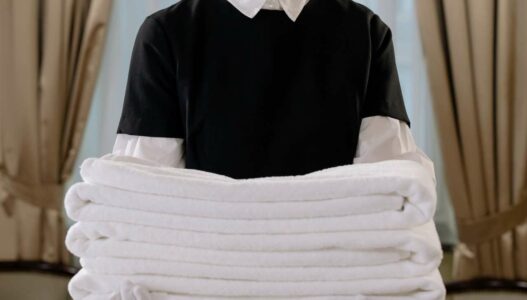Have you watched the Harry Potter series? I admire the way they swirl their wand and things get done in a jiffy. I always wished I could have a similar wand.
As a housekeeper, it would be most beneficial for you. Imagine, you just need to wave the wand and everything turns sparkling clean. Be it the lobby, rooms, laundry, or restaurant.
In fact, you don’t need any staff to do it. And because of that, the level of guest satisfaction would top the charts.
However, the sad part is that such kind of magic is impossible. But, I can tell you tips to improve hotel housekeeping operations for better guest experience.
By now, you might have figured out what this blog is about. But, before getting to the tips, let me give you an overview of the housekeeping department.
What are Housekeeping Operations in Hotels?
Housekeeping department is called the backbone of the hotel. The reason behind it is that housekeeping handles one of the most important tasks of a hotel – maintaining cleanliness and hygiene.
However, the tasks involved under housekeeping operations are not limited to it. There are other responsibilities too, like:
- Raising inventory requisitions
- Maintaining stocks
- Managing laundry services
- Handling the lost and found artifacts
- Keeping a track of hotel room thefts and losses
Although the housekeeping department is not counted amongst revenue-generating ones, you cannot deny the fact that it does play a vital role in cost-control.
How to Optimise Hotel Housekeeping Operations?
Now that we are done with a refresher course on hotel housekeeping operations, let me tell you the steps you can use to make it more efficient. Let’s take a look at them.
1. Streamline your process
When I say streamline your process, it doesn’t mean working on your SOPs. Of course, it is also important and we’ll be discussing it in the next point.
Streamlining your process means aligning hotel housekeeping operations with tasks of other departments. Let me explain in detail.
The housekeeping department is responsible for upkeep of the room and the amenities associated with it in a perfect manner. Now, this also includes checking for any maintenance issues.
Suppose, one of the rooms requires major maintenance work. In that case, the housekeeping supervisor needs to inform the front office and maintenance department, respectively.
Such tasks do take a lot of time, which means one room is out of order for a brief period. Hence, the revenue management team would ensure that sales from other rooms are on the higher side to cover the loss of one room night for that period.
This is just one example. There are many other tasks that require help from other departments. That’s why you need to streamline your hotel’s housekeeping operations to avoid any complex situations.
2. Bring timely changes in SOPs
As I said above, you need to optimise your SOPs from time to time. The reason is, it will help you improve your housekeeping operations and increase staff’s efficiency.
In college, we were taught that getting a room ready should take an average of 20 minutes. The bifurcation is as follows:
- 7 minutes – Bed making
- 5 minutes – Bathroom cleaning
- 3 minutes – Dusting
- 2 minutes – Amenities replenishing
- 3 minutes – Sweeping and mopping
But when I started working in hotels, things were actually different. Every task associated with room cleaning had a different time depending on the size of the room, the number of staff involved in it.
For example, some hotels use vacuum cleaners or mop sticks, instead of traditional brooms and mopping cloth. This aided in reducing the time required to clean one room.
Similarly, you need to figure out ways to optimise SOPs related to every process involved in the housekeeping operations.
3. Standardise the quality of cleanliness and hygiene
No one likes to stay in a shabby and dingy hotel. Moreover, after covid-19, guests are more concerned about the cleanliness and hygienic environment provided by the hotel.
That’s where the housekeeping department comes into the picture. Ensure that you’ve set the highest standards pertaining to cleanliness and hygiene. Here are some steps you can take:
- Room sanitisation after check out
- Change room linen for new guests
- Use a disinfectant for mopping the floor (opt for one with mid fragrance)
- Keep a sanitiser in each room
- Wear masks and protective gear while cleaning the room
- Opt for color-coded cleaning
4. Focus on inventory management
Inventory management is an important part of hotel housekeeping operations. That’s because the housekeeping department is responsible for raising the requisition and distributing all sorts of amenities among guests and staff members.
This includes room amenities, stationeries for the front office department (pen, files, papers, key cards etc.), staff uniforms, and other such things. Whilst the list is long, you need to ensure you don’t miss even a single item.
Here’s a blog on inventory management that can help you do it in a better way.
5. Invest in technology
Technology plays an important role in every hotel and still many of them hesitate to embrace it. Some find it expensive, while there are others who believe it’s futile to invest in technological aspects. But that’s where they go wrong.
There are various PMS that can do all your calculations, inventory management, and room status update within seconds. Moreover, if they can be integrated with other housekeeping software, it can get you live room status and help with direct bill posting in guests’ folios.
Apart from that, it can help you keep a track of guest requisitions and whether they are addressed or not. This would aid in improving guest experience.
The technological aspect is not limited to software, it includes investing in gadgets as well. You can opt for equipment like handy vacuum cleaners, carpet cleaner machines, floor scrubber and dryer, automatic room freshener, and so on.
6. Hire, train, and reward your staff
Understaffing is one of the common problems faced by the hospitality industry these days. This leads to a tremendous pressure on the existing ones, as they need to handle tasks of other employees simultaneously. And trust me, I’ve seen this happening.
The hotel where I used to work a couple of years ago was having a shortage of housekeeping staff. This created a lot of problems for the rest of us.
We had to run from floor to floor in the morning to check rooms which are due for check out. Simultaneously, we had to prepare rooms for upcoming arrivals. And to top that, we were supposed to deliver guests with requested amenities.
Because of this, none of the staff members in the housekeeping department worked for more than 2-3 months. In fact, we ourselves used to be quite exhausted by the end of the day.
7. Keep a check on your discards
Most hotels avoid the discarding process, and that’s where they suffer a loss. Basically, discarding involves removing expired items from the inventory and replenishing them with new ones.
Let’s say, you have kept a stock of old towels to discard. Now, you would either distribute them among your staff, use those for cleaning, or recycle them.
Sometimes, a staff member or a vendor can do foul play here. S/he would be replacing the old ones with new or maybe add some fresh ones in that batch for gaining extra benefits.
That’s why I recommend doing the discarding process in the presence of CCTV cameras, security personnel, and housekeeping supervisor.
8. Maintain pantry on each floor
To ensure seamless guest experience and fast service, it’s important that you have a housekeeping pantry on each floor. In case you already have one, check that it has ample stock maintained of each and every amenities.
First of all, it’ll help your housekeeping staff in avoiding running to and fro. And secondly, it’ll help in raising on time requisitions.
9. Work with right vendors
Selecting the right vendors for outsourcing any kind of facility is crucial. Moreover, if you are working with just one vendor, I would suggest you find a couple of them as a backup.
Reason being, depending on a single one would create a lot of problems, such as delay in delivery, unavailability of certain items, impromptu price fluctuations, and so on. Moreover, you need to check the authenticity of the vendors, quality of products they provide, and other factors.

